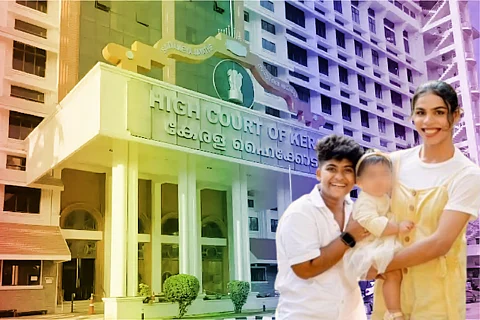

In a significant affirmation of transgender rights, the Kerala High Court has directed the Kozhikode Corporation to issue a revised birth certificate for the child of transgender couple Zahhad and Ziya Paval, identifying them as the child's “parents” instead of “father” and “mother”. Justice Ziyad Rahman AA, delivering the judgement on June 2, emphasised, “The law cannot remain static; it has to evolve in accordance with the changes in the society and the lifestyle of members of the society.”
Zahhad, a trans man, had given birth to the child on February 8, 2023. The original birth certificate described Ziya Paval, a trans woman, as the “father” and Zahhad as the “mother,” along with a reference to their transgender identity.
Shortly after the birth, the couple approached the Kozhikode Corporation requesting for the birth certificate to reflect their correct gender identity and describe them as “parents” instead of gendered parental roles. However, the Corporation issued a certificate on February 17, 2023, listing Ziya as “father (transgender)” and Zahhad as “mother (transgender)”. Their request for a gender-neutral birth certificate was rejected by authorities citing technical limitations in the Registration of Births and Deaths Act, 1969, and the Kerala Registration of Births and Deaths Rules, 1999.
Following this, the couple moved the court.
In a detailed 30-page judgement, the High Court recognised the constitutional and statutory rights of transgender persons, rooted in the Supreme Court’s 2014 NALSA decision, which affirmed the right to self-identification of gender, and the Transgender Persons (Protection of Rights) Act, 2019.
In their petition, the couple argued that the gendered identification contradicted their lived gender identities and could cause “serious problems and prejudices” for the child in education, employment, and other official documentation. “Instead of including the name of father and mother in the birth certificate of the third petitioner, including the word 'parent' can solve many issues that may come up in future,” the petition read. It added that the denial was “a violation of the fundamental rights of the petitioners.”
The High Court accepted their arguments and observed, “The parental status in terms of gender mentioned in the certificate is completely contrary to the way of life now being pursued by the petitioners, which is diametrically opposite to the concepts of gender and the unit of family, as understood under normal circumstances.”
Further, rejecting the Corporation’s argument that the statutory format of birth certificate could not be altered, the court ruled, “If a certificate as sought by the petitioners advances the welfare, interests, and the rights of the petitioners or the class/category they fall in, the court need not hesitate to step in and issue appropriate direction.”
The court also recognised the distinction between entries in the official register and what is reflected in the issued certificate. While the registry would retain the original descriptions, the certificate to be issued can reflect the couple as "parents" without gender-specific identification. The judgement made it clear that such modification would not violate any statutory provisions or affect third-party rights.
“The birth certificate is governed by Section 12 of the 1969 Act, which imposes an obligation to furnish ‘extracts’ of registration entries, not a verbatim copy,” the court said, finding such flexibility consistent with the law.
However, the court declined to read down the existing statutory forms, which the petitioners had requested. This relief was granted as an “exceptional remedy” in a “rare and exceptional case,” the judgement said.
Concluding the judgement, the court reaffirmed its commitment to constitutional values and said, “Even though the statutory recognition has been granted to transgender persons … the society as a whole is yet to accept the said reality and it is a time-consuming affair.”
Accordingly, the Kozhikode Corporation has been directed to issue a revised birth certificate to the couple within two months, identifying them as “parents” without gender attribution. “No alteration in the details entered into the registers maintained in this regard needs to be made and the modification directed is confined to the issuance of the birth certificate alone,” the judgement clarified.
The petitioners were represented by advocate Padmalakshmi, who herself made history this year as the first transgender woman to enroll in the Bar Council in Kerala.